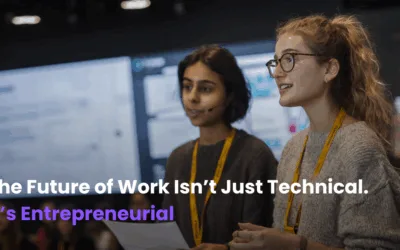Facilitation is generally misunderstood. Too many people approach it as a performance, imagining the facilitator as the focal point of a workshop, commanding the room with energy and expertise. In reality, effective facilitation is closer to coaching than performing. It is about creating pathways to progress, ensuring that teams move forward with clarity, alignment, and purpose.
A good facilitator will bring together diverse perspectives, embrace complexity, and will help translate ideas into action. When a company is looking to develop their resilience or seek out new markets, a facilitator can help get beyond the group think that happens within a company or within teams. And when it comes to innovation, facilitators should never impose solutions or control discussions. Instead, they guide teams through structured thinking processes, helping them define challenges, explore possibilities, and make decisions that lead to real outcomes.
At a time of economic instability, facilitation is not just a valuable leadership skill. It is a strategic necessity. Organisations need to adapt faster, collaborate more effectively, and ensure that their decision-making processes are robust enough to handle uncertainty. Without effective facilitation, teams can become stuck in unproductive discussions, misaligned priorities, and siloed thinking that stifles innovation.
What should facilitation be producing?
One of the most critical roles of a facilitator is to help teams define problems accurately. Many innovation efforts fail because they are built on vague or misdiagnosed challenges. UK non-profits consultant, Nick Perks describes facilitation as a process of “patterning”, where facilitators help teams identify where there may be shared value and where value can be created. This pattern recognition delivers alignment and consensus.
Facilitators also ensure that creativity is balanced with execution. While ideation is essential, commercialisation demands that ideas be tested, refined, and positioned for the market. This requires moving beyond brainstorming to structured decision-making, ensuring that solutions are viable rather than just exciting concepts.
And facilitation is only valuable if it leads to outcomes. When a facilitator is assigned to a team to help it overcome barriers or to innovate, it’s not enough to just generate ideas. A good facilitator ensures that teams have a clear backlog of tasks to complete, and the buy-in from a problem sponsor to execute on their backlog. It’s the difference between an idea that remains theoretical and one that is developed, tested, and brought successfully to market.
How facilitation can build resilience
All this matters in an economic climate that’s been described by the International Monetary Fund’s (IMF) as “divergent and uncertain. In their recent World Economic Outlook, the IMF projects global growth to remain steady at 3.3% for both 2025 and 2026, but this is a rate well below the historical average of 3.7% observed between 2000 and 2019. Generally speaking we are looking at a precarious global growth profile for the next five years.
In such a dicey economic landscape, organisations have to develop resilience.
And this is where facilitation comes in. It can help organisations to anticipate, prepare for, respond to, and adapt to both incremental changes, and sudden disruptions.. It’s a key defence capability that also has the added benefit of bringing diverse perspectives together and developing innovation muscle.
In times of economic instability, the ability to facilitate collaboration and drive strategic initiatives is essential. Organisations that invest in strong facilitation practices are better equipped to manage uncertainty, mitigate risks, and capitalise on emerging opportunities, thereby securing their position in a fluctuating market.
Why organisations should invest in good facilitators
Organisational development leader, MonaLisa Salib has said that effective facilitators create an environment where participants challenge ideas constructively, and create an opportunity for change. Indeed, it grows leadership.
Facilitation is not just a tool for running productive meetings. It is a strategic capability that enables organisations to bridge disciplines and respond to market shifts with speed and precision.
Given the sheer unpredictability of the world we are facing right now, bringing together the expertise you have access to, and creating clarity from complexity as well as driving action, is the way to stay sustainable as a business. Organisations that embed strong facilitation practices will be better positioned to navigate the bumpy ride ahead, and to create value through innovation.
Want to know more?
Read our article on Collaborative Learning: The Key to Innovation and Adaptability in Uncertain Times



